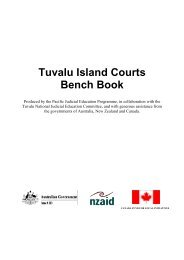Fiji Magistrates Bench Book - Federal Court of Australia
Fiji Magistrates Bench Book - Federal Court of Australia
Fiji Magistrates Bench Book - Federal Court of Australia
Create successful ePaper yourself
Turn your PDF publications into a flip-book with our unique Google optimized e-Paper software.
The term ‘disease <strong>of</strong> the mind’ has <strong>of</strong>ten been defined by what it is not. It is not:<br />
• a temporary problem <strong>of</strong> the mind due to an external factor such as violence, drugs, or<br />
hypnotic influences; or<br />
• a self-inflicted incapacity <strong>of</strong> the mind; or<br />
• an incapacity that could have been reasonably foreseen as a result <strong>of</strong> doing or omitting to<br />
do something, such as taking alcohol with pills against medical advice: R v Quick &<br />
Paddison (1973) 57 CrAppR 722.<br />
In these cases, the defendant may not be excused from criminal responsibility, although there are<br />
difficult borderline cases.<br />
Expert evidence<br />
In order to plead a defence <strong>of</strong> insanity, the defendant should have medical evidence which points<br />
to his or her mental incapacity. The defendant’s evidence alone will rarely be enough to prove<br />
this defence: Bratty v Attorney-General for Northern Ireland [1963] AC 386.<br />
The evidence from a psychologist with no medical qualification is not sufficient to raise the<br />
defence <strong>of</strong> insanity: R v Mackenney & Pinfold (1983) 76 CrAppR 271.<br />
2.6 Intoxication: s13 Penal Code<br />
Intoxication cannot be used as a defence to a criminal charged, except as provided in s13 Penal<br />
Code.<br />
Section 13 Penal Code allows intoxication to be used as a defence to any criminal charge in the<br />
following situations:<br />
1. If at the time <strong>of</strong> the <strong>of</strong>fence, the defendant did not know that the act or omission was wrong<br />
or he or she did not know what he or she was doing because his or her state <strong>of</strong> intoxication<br />
was caused without consent, due to the malicious or negligent act <strong>of</strong> another person:<br />
s13(2)(a) Penal Code.<br />
• This is referred to as involuntary intoxication.<br />
• If the defence above is established, you must discharge the defendant: s12(3) Penal Code.<br />
• Involuntary intoxication is not a defence if the defendant forms the necessary mens rea <strong>of</strong><br />
the <strong>of</strong>fence, either because <strong>of</strong> or despite the intoxication: R v Kingston [1994] 3 WLR<br />
519.<br />
2. If at the time <strong>of</strong> the <strong>of</strong>fence, the defendant did not know the act or omission was wrong or he<br />
or she did not know what he or she was doing because intoxication caused him or her to be<br />
insane, temporarily or otherwise: s13(2)(b) Penal Code. This defence is referred to as<br />
voluntary intoxication.<br />
<strong>Fiji</strong> <strong>Magistrates</strong> <strong>Bench</strong> <strong>Book</strong> April 2004
















